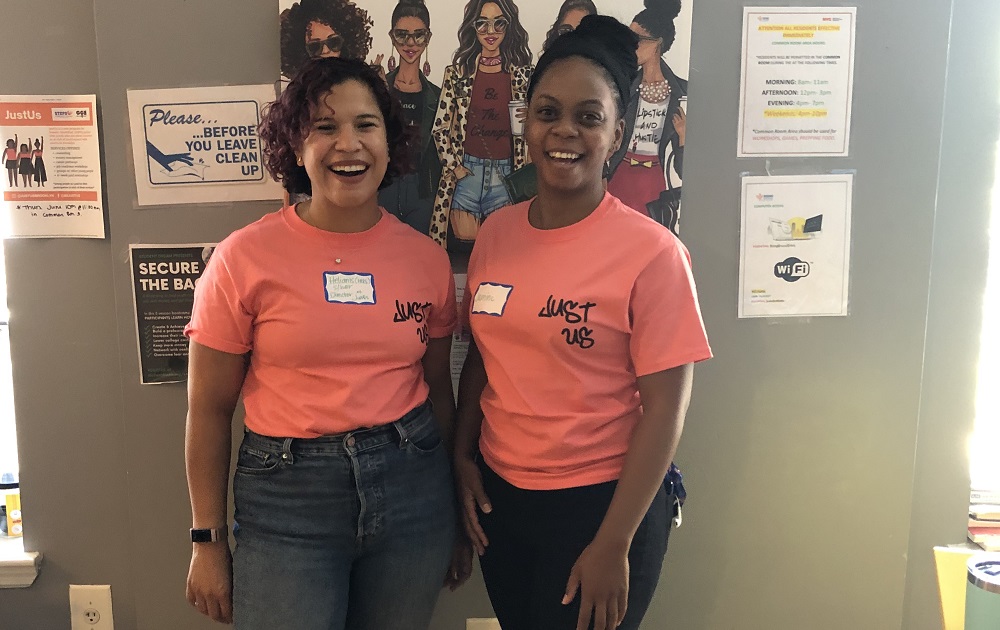Since it launched last October, 25 youth have enrolled in a three-year pilot project that pays girls and queer youth involved in the criminal justice system, or who are at-risk for winding up there, to participate in projects aimed at keeping them out of detention facilities.
 Run by Rising Ground's Steps to End Family Violence program and funded by New York City's Administration for Children's Services, JustUs provides individual and group counseling; legal advocacy; employment workshops; and internships for Brooklyn youth. The program serves females who are lesbian, bisexual and straight and youth who are non-binary, trans or queer.
Run by Rising Ground's Steps to End Family Violence program and funded by New York City's Administration for Children's Services, JustUs provides individual and group counseling; legal advocacy; employment workshops; and internships for Brooklyn youth. The program serves females who are lesbian, bisexual and straight and youth who are non-binary, trans or queer.
“A lot of times, people are looking for support and they want to be heard and seen,” said Helianis Quijada Salazar, director of JustUs. “We try to customize everything to meet the unique needs of a person.”
Said Michelle Grier, senior director of programs for Girls for Gender Equity, a JustUs partner: “People have a lot that they want [these] young people to do. They want to see certain things from them without asking them what they need.”
JustUs pays a maximum stipend of $540 weekly to youth who fully participate in its programming. Youths generally are enrolled in that and other diversion programs after they are released from police custody, following an arrest, or during and after court proceedings. In addition to being an alternative to incarceration, diversion programs may supplement a juvenile’s parole.
Pandemic posed particular problems for LGBTQ juveniles
Those 25 participants were chosen from a pool of 40 youth who’ve been referred to JustUs amid a pandemic that, in its own ways, amplified the particular struggles of queer youth involved in the justice system, advocates for juveniles said.
“I have heard stories from young people that I've worked with ... where they might dress a certain way when they leave home and, then, when they get to school, they change,” Quijada Salazar said. While online learning, she added, may have eased the pressure of sneaking to wear attire reflecting a youth’s self-perception, as one example, it also presented other pressures. During COVID-19 some youth have been stuck at home with relatives who do not accept their gender identity or expression. “That's been an extra stress,” she said.
Statewide, 106 girls and queer youth combined, 757 boys and seven youth whose gender wasn’t listed had charges filed against them in family courts in 2020, according to New York's Division of Criminal Services. Of those 7- to 17-year-olds, 65% were Black and 25% were Hispanic.
“There is still a lot of internalized homophobia within some of those communities,” Quijada Salazar said, referring to communities of color.
Not every potential JustUs participant has opted to take part. One youth who’d been accepted into the program chose, instead, to complete a sentence in juvenile detention, Quijada Salazar said. She suspects that some young people do view being locked up as a better alternative to being in their home neighborhoods, where they have endured trauma related to their sexual identity.
“It feels safer to not engage,” she said.
If upcoming evaluations of the pilot project show good outcomes, city officials said they hope to expand the project citywide. “I'm really excited about this work,” Quijada Salazar said. “ I feel confident that we'll be able to demonstrate that this was an effective way to help … “
This article was updated on July 28 to correct the launch date and name of the agency that directs JustUs.
